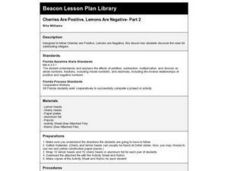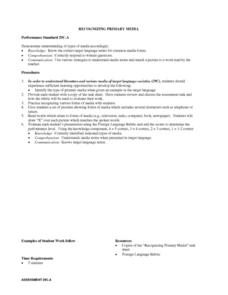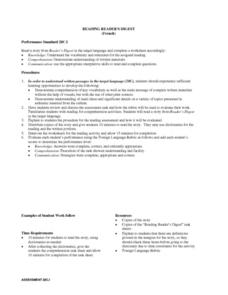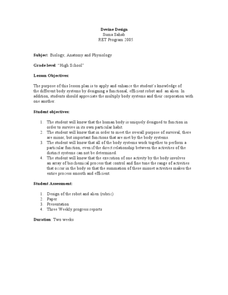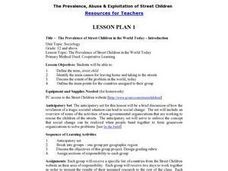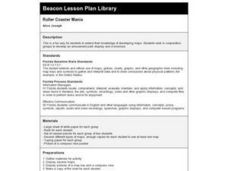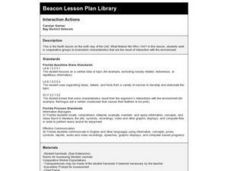Curated OER
Types of Societies
Learners compare and contrast the societies of India and the United States by creating a chart. In groups, they give examples of each type of classification. They present their material to the class while identifying the role of the...
Curated OER
Influences on Cultures
Students examine a timeline of events of a specific cultural group. Using the internet, they research the cultural group using a worksheet to guide them. They present their information to the class and create a poster about the...
Curated OER
What? Where? Why?
Pupils use the internet to research the geography of an area where the foreign language they are practicing is spoken. In groups, they use this information to write a short report on the geographical features and how it affects the...
Curated OER
Immigration Scrapbook
Students use the internet to gather information on immigrants from the beginning of time. Using this information, they create a scrapbook showing the various immigrant groups and their effects on different cultures throughout the world....
Curated OER
Rockin' and Rollin'
Seventh graders, in groups, describe the three major types of rocks through either a song, skit, poem, etc. They present their work to the class during a "rock concert."
Curated OER
Cherries Are Positive, Lemons Are Negative- Part 2
Third graders, in groups, subtract integers by following Cherries are Positive, Lemons are Negative. They discover the rules for subtracting integers by using cherry heads and lemon heads.
Curated OER
Transportation and Communication Timeline
Students discuss the growth of transportation and communication technology since 1500 C.E. Individually or in groups, they research lists of developments in the two areas. Finally, students create timelines indicating the development...
Curated OER
Critic's Choice
Students read two opposing types literature. In groups, they role play the role of a critic to show they comprehend the material. They are introduced to new vocabulary and practice speaking the words in the foreign language.
Curated OER
What's My Line?
Young scholars work in groups to write and perform a role play in the target language. They prepare an outline or notes on index cards. Each person in the group will pretend to have a job in the target country. They will describe their...
Curated OER
Recognizing Primary Media
Students review the types of media from a previous activity. In groups, they practice saying the new words in a foreign language. They complete a worksheet and review their answers as a class. They also match a picture of the media to...
Curated OER
Reading Reader's Digest
Young scholars practice reading a Reader's Digest in French. In groups, they identify new vocabulary and practice prouncing the words. They complete a worksheet in which they practice writing complete sentences. They are graded on a...
Curated OER
Class Book
Third graders review how they can save their work on a computer once they are finished. As a class, they complete various assignments based on a rubric they are given and save them to a disk. Using the assignments, they combine all of...
Curated OER
Devine Design
Young scholars examine the functions of the different systems in the body. They discover how different systems must work together to make the body function correctly. They identify the needs of the body to help it survive.
Curated OER
Local Laws Citizens Follow
Students identify and disuss the various laws that are in place in their commmunity. In groups, they illustrate the different laws and write a description. As a class, they discuss the reasons why the laws are necessary and their...
Curated OER
A Picture is Worth a Thousand Words
Sixth graders work to write questions for a class survey. In this survey lesson, 6th graders survey their class members by asking the 4 questions they developed and will record their answers on the culminating assessment...
Curated OER
How Can Our Talents Be Used Together?
Students investigate their individual talents. In this togetherness lesson, students listen to the poem "Togetherness Chant" and change the final stanza from play to work. Students brainstorm how they can use their individual talents for...
Curated OER
Efficiency
Young scholars review the definitions for efficiency and productivity. In groups, they observe a group of working people and develop ways they can increase their productivity. They write up their formal recommendations and then present...
Curated OER
The Prevalence of Street Children in the World Today - Introduction
Students are introduced to the topic of street children. They identify the main reasons why they are lead to a live of living on the streets. In groups, they discuss the extent of the problem throughout the world today. They create an...
Curated OER
Classifying Resources
Students discuss the difference between the three types of productive resources. In groups, they classify and organize examples into the correct category on a chart. As a class, they discuss how each type is used in the production of a...
Curated OER
Musical Moments
Learners listen to popular music in French. In groups, they identify and practice speaking the words they are unfamiliar with and examine the context of the song. They complete a worksheet with a partner to end the lesson and evaluate...
Curated OER
Roller Coaster Mania
Fifth graders extend their knowledge of developing maps. They work in cooperative groups to develop an amusement park display and a brochure.
Curated OER
Historical Fiction: Persuasive Presentation
Fifth graders read a book addressing a specific historical time period that was chosen by their working group. They complete journal entries as they read the book. They create a group PowerPoint explaining the personal point of view and...
Curated OER
Reading Race
First graders observe how the first sentence of a story is read very slowly and can be read faster and with more expression. They then read the same book three times to become more familiar with the words in the book and then read it...
Curated OER
Interaction Actions
Fifth graders, in groups, write about things that happen as a result of interacting with their environment.







